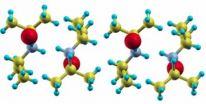(Press-News.org) PHILADELPHIA—A mailing or phone call to help patients get screened for colorectal cancer significantly increases their chances of actually getting tested, according to a study published in the January issue of Cancer Epidemiology, Biomarkers and Prevention by researchers at the Kimmel Cancer Center at Jefferson.
The research team, led by Ronald E. Myers, Ph.D., Professor and Director of Division of Population Science, Department of Medical Oncology at Thomas Jefferson University, performed a randomized, controlled trial of 945 people aged 50-79 to test the impact of a new, preference-based navigation intervention, as opposed to standard mailing or usual care, on screening rates.
A third of the patients received a "tailored" phone call to encourage them to perform their preferred screening test (colonoscopy vs. at-home blood stool test), plus a mailing of preferred information; another third were sent information on colonoscopy and a stool blood test kit; while the last third received no intervention.
Patients who received a phone call and/or mailing were almost three times as likely to undergo screening six months later compared to those who had no intervention. However, there was no significant difference between the phone and mailed interventions versus mailings only on screening rates.
While colorectal cancer screening rates are increasing in the United States, rates lag behind those for breast and cervical cancer screening. Screening and early detection of colon and rectal cancer holds tremendous promise for reducing the toll of colon and rectal cancer.
Colorectal cancer is the third leading cause of cancer death in this country with more than 140,000 new cases diagnosed each year. Late diagnoses will account for many of the colorectal cancer related deaths.
The study, which was conducted between 2007 and 2011, included 10 primary care practices affiliated with the Christiana Care Health System in Delaware that used a comment medical record system.
The research team searched for patients who had no prior diagnosis of colorectal neoplasia or inflammatory bowel diseases, had visited one of the participating practices within the previous two years, and were not compliant with American Cancer Society colorectal cancer screening guidelines.
For the study, 312 patients received a tailored intervention, where they were informed about both colonoscopy and blood stool tests and then were sent information on colonoscopy or the actual blood test performed, based on their preference. Another group, consisting of 316 patients, was mailed information about both colonoscopy and stool blood test performed. The remaining 317 were sent no information or tests and did not receive any phone calls.
Overall screening adherence at six months was significantly higher in both invention groups compared to the control group, the researchers found. Thirty-eight percent of patients who received the tailored phone interventions and 33 percent of patients who received mailings completed screening tests. Only 12% of patients in the control group completed screening tests.
In terms of the intervention groups, the researchers found that preference-based navigation did not significantly boost overall adherence to a level that was significantly higher than that achieved by mail, but increased participant performance of their preferred screening test in comparison to the mailed intervention, especially colonoscopy use.
"The study showed that both strategies were superior to usual care, and that there is not a one-size fits all approach to screening," said Dr. Myers. "The next step is to determine if an intervention strategy that maximizes screening test access, incorporates patient preference, and engages providers can achieve higher screening rates compared to just mailings."
INFORMATION:
Phone and mailed interventions significantly increase colorectal cancer screening rates
Patients 3 times more likely to get screened with phone navigation and mailings, researchers at Jefferson's Kimmel Cancer Center found
2013-01-28
ELSE PRESS RELEASES FROM THIS DATE:
Stanford researchers break million-core supercomputer barrier
2013-01-28
Stanford Engineering's Center for Turbulence Research (CTR) has set a new record in computational science by successfully using a supercomputer with more than one million computing cores to solve a complex fluid dynamics problem—the prediction of noise generated by a supersonic jet engine.
Joseph Nichols, a research associate in the center, worked on the newly installed Sequoia IBM Bluegene/Q system at Lawrence Livermore National Laboratories (LLNL) funded by the Advanced Simulation and Computing (ASC) Program of the National Nuclear Security Administration (NNSA). Sequoia ...
Smart organizations should also be stupid according to new theory
2013-01-28
"We see functional stupidity as the absence of critical reflection. It is a state of unity and consensus that makes employees in an organisation avoid questioning decisions, structures and visions", says Mats Alvesson. "Paradoxically, this sometimes helps to raise productivity in an organisation."
Together with colleague André Spicer, Mats Alvesson has written an article entitled 'A Stupidity-Based Theory of Organisations', which was recently published in the renowned Journal of Management Studies and has been featured in the Financial Times. In the article, he expounds ...
Progressive optics for side mirrors ends automobile blind spots without distorting view
2013-01-28
WASHINGTON, Jan. 28, 2013—A new optical prescription for automobile side-view mirrors may eliminate the dreaded "blind spot" in traffic without distorting the perceived distance of cars approaching from behind. As described in a paper published today in the Optical Society's (OSA) journal Optics Letters, objects viewed in a mirror using the new design appear larger than in traditional side-view mirrors, so it's easier to judge their following distance and speed.
Today's motor vehicles in the United States use two different types of mirrors for the driver and passenger ...
Pandemic controversies: The global response to pandemic influenza must change
2013-01-28
'Evil' scientists, deadly viruses and terrorist plots are usually the preserve of Hollywood blockbusters. But when it comes to pandemic influenza, it is the stuff of real life. As controversy about research into the H5N1 bird flu virus continues, a new paper argues for a complete overhaul of current approaches to pandemic preparedness.
To Pandemic or Not? Reconfiguring Global Responses to Influenza, by Dr Paul Forster, of the ESRC STEPS Centre, investigates the H1N1 swine flu pandemic of 2009-10 and sets out some vital lessons if we are to prepare for pandemic influenza ...
Fewer people adding salt at the table
2013-01-28
The number of people in England adding salt to food at the table fell by more than a quarter in the five years following a national campaign, according to research published in the British Journal of Nutrition.
In 2003, the UK Food Standards Agency and the Department of Health launched a national salt reduction campaign to raise public awareness of the impact of salt on health and to work with the food industry to reduce the amount of salt in processed foods.
Although previous research found that the national campaign led to an overall reduction in salt intake, this ...
Novel materials: Smart and magnetic
2013-01-28
Novel, smart materials like shape memory alloys very often display so-called glass-like magnetism. Other smart materials with similar properties include those which, when exposed to a magnetic field, change their electrical resistance, known as manganites, or change their temperature, known as magnetocaloric materials. Kaustav Mukherjee and his colleagues from the Consortium for Scientific Research Indore in India studied a key stage in the formation of such a magnetic glass material, called Pr0.5 Ca0.5 Mn0.975 Al0.025 O3, in a paper about to be published in EPJ B.
They ...
A new material for environmentally friendlier electronics
2013-01-28
The electronics industry has a remarkable impact on the environment, yet research is devising new solutions to reduce it. Among these, a new compound with an unutterable name, the diisopropylammonium bromide (DIPAB), a new ferroelectric material created by an international team of researchers that include Massimo Capone and Gianluca Giovannetti of Istituto Officina dei Materiali at CNR and of the International School for Advanced Studies of Trieste (SISSA), whose research has been just published in Science magazine.
"A ferroelectric material has properties analogous ...
A safer way to vaccinate
2013-01-28
CAMBRIDGE, MA -- Vaccines usually consist of inactivated viruses that prompt the immune system to remember the invader and launch a strong defense if it later encounters the real thing. However, this approach can be too risky with certain viruses, including HIV.
In recent years, many scientists have been exploring DNA as a potential alternative vaccine. About 20 years ago, DNA coding for viral proteins was found to induce strong immune responses in rodents, but so far, tests in humans have failed to duplicate that success.
In a paper appearing in the Jan. 27 online ...
Some health benefits of berries may not make it past your mouth
2013-01-28
COLUMBUS, Ohio – Research has suggested that compounds that give colorful fruits their rich hues, especially berries, promote health and might even prevent cancer. But for the first time, scientists have exposed extracts from numerous berries high in those pigments to human saliva to see just what kinds of health-promoting substances are likely to survive and be produced in the mouth.
It's too early to name the best berry for health promotion based on this initial work. But the researchers have discovered that two families of pigments that provide berries with their colors, ...
Soya protein can be replaced by rapeseed protein
2013-01-28
Jena (Germany) Today, more than 500 million people are suffering from a lack of adequate protein in their diet. Each year, the number of human beings increases by 80 million, a figure which is equivalent to the present population of Germany. Thus, providing enough food, particularly sufficient protein for the increasing populace is a challenging task for societies all over the world. On a prospective basis, a progressively smaller proportion of human protein requirement can be provided by animal proteins such as meat, eggs, and milk. "However, by feeding valuable plant ...
LAST 30 PRESS RELEASES:
Heart attack deaths rose between 2011 and 2022 among adults younger than age 55
Will melting glaciers slow climate change? A prevailing theory is on shaky ground
New treatment may dramatically improve survival for those with deadly brain cancer
Here we grow: chondrocytes’ behavior reveals novel targets for bone growth disorders
Leaping puddles create new rules for water physics
Scientists identify key protein that stops malaria parasite growth
Wildfire smoke linked to rise in violent assaults, new 11-year study finds
New technology could use sunlight to break down ‘forever chemicals’
Green hydrogen without forever chemicals and iridium
Billion-DKK grant for research in green transformation of the built environment
For solar power to truly provide affordable energy access, we need to deploy it better
Middle-aged men are most vulnerable to faster aging due to ‘forever chemicals’
Starving cancer: Nutrient deprivation effects on synovial sarcoma
Speaking from the heart: Study identifies key concerns of parenting with an early-onset cardiovascular condition
From the Late Bronze Age to today - Old Irish Goat carries 3,000 years of Irish history
Emerging class of antibiotics to tackle global tuberculosis crisis
Researchers create distortion-resistant energy materials to improve lithium-ion batteries
Scientists create the most detailed molecular map to date of the developing Down syndrome brain
Nutrient uptake gets to the root of roots
Aspirin not a quick fix for preventing bowel cancer
HPV vaccination provides “sustained protection” against cervical cancer
Many post-authorization studies fail to comply with public disclosure rules
GLP-1 drugs combined with healthy lifestyle habits linked with reduced cardiovascular risk among diabetes patients
Solved: New analysis of Apollo Moon samples finally settles debate about lunar magnetic field
University of Birmingham to host national computing center
Play nicely: Children who are not friends connect better through play when given a goal
Surviving the extreme temperatures of the climate crisis calls for a revolution in home and building design
The wild can be ‘death trap’ for rescued animals
New research: Nighttime road traffic noise stresses the heart and blood vessels
Meningococcal B vaccination does not reduce gonorrhoea, trial results show
[Press-News.org] Phone and mailed interventions significantly increase colorectal cancer screening ratesPatients 3 times more likely to get screened with phone navigation and mailings, researchers at Jefferson's Kimmel Cancer Center found




